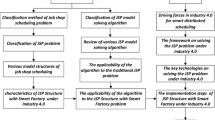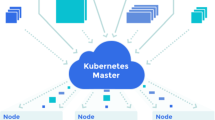Abstract
High availability plays an important role in heterogeneous clusters, where processors operate at different speeds and are not continuously available for processing. Existing scheduling algorithms designed for heterogeneous clusters do not factor in availability. We address in this paper the stochastic scheduling problem for heterogeneous clusters with availability constraints. Each node in a heterogeneous cluster is modeled by its speed and availability, and different classes of tasks submitted to the cluster are characterized by their execution times and availability requirements. To incorporate availability and heterogeneity into stochastic scheduling, we introduce metrics to quantify availability and heterogeneity in the context of multiclass tasks. A stochastic scheduling algorithm SSAC (stochastic scheduling with availability constraints) is then proposed to improve availability of heterogeneous clusters while reducing average response time of tasks. Experimental results show that our algorithm achieves a good trade-off between availability and responsiveness.
Similar content being viewed by others
References
Apon, A., Wilbur, L.: AmpNet—a highly available cluster interconnection network. In: Proceedings IEEE Intl’ Symp. Parallel and Distributed Processing, April 22–26, 2003
Braun, T.D., et al.: A comparison study of static mapping heuristics for a class of meta-tasks on heterogeneous computing systems. In: Proc. Workshop Heterogeneous Computing, pp. 15–29, Apr. 1999
Cai, X., Wu, X., Zhou, X.: Dynamically optimal policies for stochastic scheduling subject to preemptive-repeat machine breakdowns. IEEE Trans. Autom. Sci. Eng. 2(2) (2005)
Chakraverty, S.: Cosynthesis on multiprocessor architectures with high availability. In: Proc. 17th Int’l Conf. VLSI Design, pp. 927–932 (2004)
Dogan, A., Özgüner, F.: Reliable matching and scheduling of precedence-constrained tasks in heterogeneous distributed computing. In: Proc. Int’l Conf. Parallel Processing, pp. 307–314 (2000)
Dogan, A., Özgüner, F.: LDBS: a duplication based scheduling algorithm for heterogeneous computing systems. In: Proc. Int’l Conf. Parallel Processing, B.C., Canada, pp. 352–359 (2002)
Hunt, G., Goldszmidt, G., King, R., Mukherjee, R.: Network dispatcher: a connection router for scalable Internet services. In: Proc. Int’l World Wide Web Conf., April 1998
Jiang, Y., Tham, C.-K., Ko, C.-C.: An approximation for waiting time tail probabilities in multiclass systems. IEEE Commun. Lett. 5(4), 175–177 (2001)
Lau, H.C., Zhang, C.: Job scheduling with unfixed availability constraints. In: Proc. 35th Meeting of the Decision Sciences Institute (DSI), Boston, USA, November 2004, pp. 4401–4406
Leangsuksun, C., Tikotekar, A., Pourzandi, M., Haddad, I.: Feasibility study and early experimental results towards cluster survivability. In: Proc. IEEE Int’l Symp. Cluster Computing and the Grid, pp. 77–81 (2005)
Maheswaran, M., Siegel, H.J.: A dynamic matching and scheduling algorithm for heterogeneous computing systems. In: Proc. the Seventh Heterogeneous Computing Workshop, pp. 57–69 (1998)
Nain, P., Towsley, D.: Stochastic scheduling in a multiclass G/G/1 queue. In: Proc. 31st IEEE Conf. on Decision and Control, pp. 3340–3341 (1992)
Qin, X., Jiang, H.: A dynamic and reliability-driven scheduling algorithm for parallel real-time jobs on heterogeneous clusters. J. Parallel Distrib. Comput. 65(8), 885–900 (2005)
Ranaweera, S., Agrawal, D.P.: Scheduling of periodic time critical applications for pipelined execution on heterogeneous systems. In: Proc. Int’l Conf. Parallel Processing, Sept. 2001, pp. 131–138
Schmidt, G.: Scheduling with limited machine availability. Eur. J. Oper. Res. 121, 1–15 (2000)
Schopf, J.M., Berman, F.: Stochastic scheduling. In: Proc. ACM/IEEE Conf. Supercomputing, 13–18 Nov. 1999
Sethuraman, J., Squillante, M.S.: Optimal stochastic scheduling in multiclass parallel queues. In: Proc. ACM Sigmetric Conf., May 1999
Solter, N.A., Tripathi, A.: Architecture and protocol for reliable event delivery to clients of a high-availability cluster. In: Proc. 18th Int’l Parallel and Distributed Processing Symposium, April 2004
Song, S., Kwok, Y.-K., Hwang, K.: Trusted job scheduling in open computational grids: security-driven heuristics and a fast genetic algorithms. In: Proc. Int’l Symp. Parallel and Distributed Processing (2005)
Srinivasn, S., Jha, N.K.: Safety and reliability driven task allocation in distributed systems. IEEE Trans. Parallel Distrib. Syst. 10(3), 238–251 (1999)
Topcuoglu, H., Hariri, S., Wu, M.-Y.: Performance-effective and low-complexity task scheduling for heterogeneous computing. IEEE Trans. Parallel Distrib. Syst. 13(3) (2002)
Xie, T., Qin, X.: A new allocation scheme for parallel applications with deadline and security constraints on clusters. In: Proc. IEEE Int’l Conf. Cluster Computing, Boston, USA, Sept. 2005
Xie, T., Qin, X.: Enhancing security of real-time applications on grids through dynamic scheduling. In: Proc. 11th Workshop Job Scheduling Strategies for Parallel Processing, MA, June 2005
Author information
Authors and Affiliations
Corresponding author
Rights and permissions
About this article
Cite this article
Xie, T., Qin, X. Stochastic scheduling for multiclass applications with availability requirements in heterogeneous clusters. Cluster Comput 11, 33–43 (2008). https://doi.org/10.1007/s10586-007-0049-0
Received:
Accepted:
Published:
Issue Date:
DOI: https://doi.org/10.1007/s10586-007-0049-0




